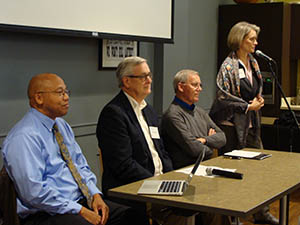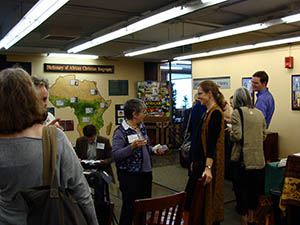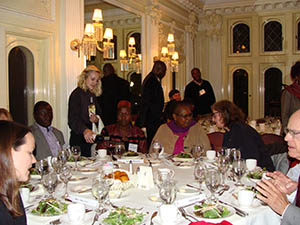Conference Overview: African Christian Biography: Narratives, Beliefs, and Boundaries
 The Center for Global Christianity and Mission at Boston University hosted the conference on the theme of “African Christian Biography: Narratives, Beliefs, and Boundaries,” from Thursday, October 29 to Saturday, October 31. Approximately sixty scholars and graduate students converged on the School of Theology from Nigeria, Zimbabwe, Kenya, Ghana, Great Britain, and various universities in the United States and Canada to present papers and discuss issues on the theme of African Christian Biography. As an intersection between scholars in religious studies and African studies, the conference was a venue for cross-fertilization between the various fields represented. Furthermore, it was an opportunity to celebrate the twentieth anniversary of the Dictionary of African Christian Biography (DACB).
The Center for Global Christianity and Mission at Boston University hosted the conference on the theme of “African Christian Biography: Narratives, Beliefs, and Boundaries,” from Thursday, October 29 to Saturday, October 31. Approximately sixty scholars and graduate students converged on the School of Theology from Nigeria, Zimbabwe, Kenya, Ghana, Great Britain, and various universities in the United States and Canada to present papers and discuss issues on the theme of African Christian Biography. As an intersection between scholars in religious studies and African studies, the conference was a venue for cross-fertilization between the various fields represented. Furthermore, it was an opportunity to celebrate the twentieth anniversary of the Dictionary of African Christian Biography (DACB).
 In the opening plenary, DACB Project Director Jonathan Bonk presented a brief historical overview by looking at the “What?, the Why?, the How?, and the Now What?” of the project. In the Friday morning plenary address, Prof. Lamin Sanneh of Yale University focused his talk on Sir Samuel Lewis whose extraordinary life illustrated the power of human example in the service of religion and society in 19th century West Africa. The afternoon plenary panel with noted scholars Kathleen Sheldon, Richard Elphick, and Diana Wylie addressed, among other questions, the challenge of the portrayal of belief in biography as well as the various uses of biography in historical writing. The dinner plenary by Boston University professor Linda Heywood offered an opportunity to explore the life of a notable 17th century Kongo figure, Queen Njinga.
In the opening plenary, DACB Project Director Jonathan Bonk presented a brief historical overview by looking at the “What?, the Why?, the How?, and the Now What?” of the project. In the Friday morning plenary address, Prof. Lamin Sanneh of Yale University focused his talk on Sir Samuel Lewis whose extraordinary life illustrated the power of human example in the service of religion and society in 19th century West Africa. The afternoon plenary panel with noted scholars Kathleen Sheldon, Richard Elphick, and Diana Wylie addressed, among other questions, the challenge of the portrayal of belief in biography as well as the various uses of biography in historical writing. The dinner plenary by Boston University professor Linda Heywood offered an opportunity to explore the life of a notable 17th century Kongo figure, Queen Njinga.
In the concurrent sessions, questions raised either in the papers or in the subsequent discussion included the role of biography in pedagogy, orality and memory in biography, the use of photography and film in biography, and the use of biography for highlighting the stories of women the Global South. Almost a third of the papers examined the stories of African women, exploring their roles as helpers and leaders, most often unrecognized in the historical record. The discussions also looked at the role of biographers as portrait artists who must paint their subjects with humility and empathy.
 In the closing session, the progress of the DACB was praised and many participants offered ideas and challenges for new developments in the future. Conference organizer Dana Robert offered a few words about the book that will be published as a fruit of the conference.
In the closing session, the progress of the DACB was praised and many participants offered ideas and challenges for new developments in the future. Conference organizer Dana Robert offered a few words about the book that will be published as a fruit of the conference.
View the ACB Conference booklet.



